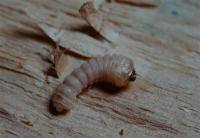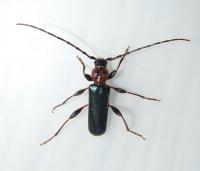House longhorn Hylotrupes bajulus
Adult beetle
Size: 15-20mm
Shape: long beetle shape
Colour: black with greyish white markings
Antennae: long
Distinguishing features: typical longhorn beetle shape with distinctive patches of grey hairs and scales on the thorax and wing cases. These may get rubbed off in old specimens.
Adults eat: very little.
Larvae eat: sapwood
Damage is: large oval tunnels in wood, packed with cylindrical frass. Exit holes are large (3-4mm) and oval in shape.
Other info: Although common in parts of Europe, this species is rare in the UK. It has been found in roof timbers in the Camberley area of Surrey and is sometimes imported in building timber and furniture. It can cause severe damage and weakening of structural timber.
There are hundreds of species of longhorns which attack growing and recently felled timber. One of the most commonly found is the Bark longhorn, Phymatodes sp, which is often discovered emerging from logs brought into homes.
Size: 15-20mm
Shape: long beetle shape
Colour: black with greyish white markings
Antennae: long
Distinguishing features: typical longhorn beetle shape with distinctive patches of grey hairs and scales on the thorax and wing cases. These may get rubbed off in old specimens.
Adults eat: very little.
Larvae eat: sapwood
Damage is: large oval tunnels in wood, packed with cylindrical frass. Exit holes are large (3-4mm) and oval in shape.
Other info: Although common in parts of Europe, this species is rare in the UK. It has been found in roof timbers in the Camberley area of Surrey and is sometimes imported in building timber and furniture. It can cause severe damage and weakening of structural timber.
There are hundreds of species of longhorns which attack growing and recently felled timber. One of the most commonly found is the Bark longhorn, Phymatodes sp, which is often discovered emerging from logs brought into homes.

House longhorn Hylotrupes bajulus
100%


